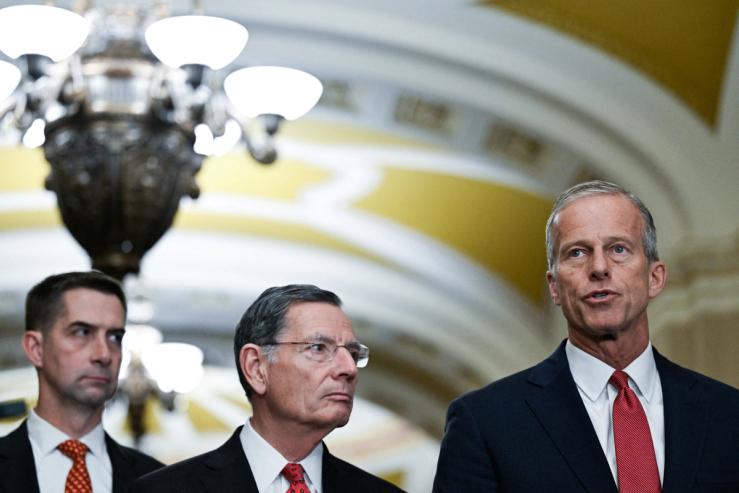The News
The Senate’s negotiations on reopening the government are descending into another impasse.
Democrats are not ready to cave to GOP pressure to reopen the government without more assurances on health insurance subsidies, and Republicans are not opening the door to further concessions. They quickly rejected Senate Minority Leader Chuck Schumer’s public offer to attach an extension of the enhanced subsidies to a government funding bill, and each party rejected the others’ proposals to pay federal workers during the shutdown.
Sen. Roger Marshall, R-Kan., called Democrats’ latest proposal a “horrible idea.” He said he was willing to talk to the opposing party about health care only after the government reopens. It’s the same position Republicans have taken for 38 days of the shutdown: Rejecting Democrats’ attempts to link health care to a stopgap funding bill.
“We’re pretty frustrated. All due to respect, we might as well go home and start over again. It’s disappointing that they think this is what’s going to reopen the government,” Marshall said.
There is no funding proposal at the moment that can get 60 votes, although appropriators in both parties continued talking on Friday.
Amid the disarray, Senate Majority Leader John Thune is warning Republicans of possible weekend work as flight delays and cancellations add to the pain of the shutdown. Senate Republicans huddled on Friday afternoon after Schumer’s floor speech but seemed to see no immediate path forward.
“There are a lot of conversations that have been had that I think have moved everybody in a positive direction, but it’s unfortunate to see this,” said Sen. Katie Britt, R-Ala., who is speaking to Democrats and met with Thune on Friday.
“Maybe [Democrats] need to go home and talk to their constituents and not listen to their consultants.”
Know More
Schumer’s offer won’t be what ends the shutdown, and it may simply be aimed at getting President Donald Trump to engage. Its biggest significance: that it represents something all 47 Democratic caucus members can stand behind after divides among them had started to emerge.
Most of the caucus sat on the Senate floor with Schumer to endorse the pact; that display was the idea of Sen. Gary Peters, D-Mich., who has worked to broker a shutdown deal. One aide said it’s being referred to as “the Peters Plan.”
Schumer’s proposal would also involve votes on a package of full-year appropriations bills and a bipartisan negotiating panel on health care. At this point, since the insurance markets are already open, it would be difficult to install an income cap on the Affordable Care Act subsidies in time for 2026 insurance plans anyway.
“We will agree with the Republican request not to start negotiations until after the government reopens,” Schumer said. All Republicans have to do is say yes to extend current law for one year.”
Schumer and Peters’ product is a step down from what Democrats proposed in September — a permanent extension of those enhanced subsidies — but Republicans do not support attaching unrelated policies to a government funding bill. And they certainly don’t want to be having this same fight again next year, when the one-year extension would be expiring.
“We’re tired of it. The Democrats need to open the government,” Marshall said. “I think they’re really feeling the pressure.”
All momentum is not totally lost, however. Senators in both parties seemed willing to try and continue working on the bill to pay government workers, although doing so would alleviate some of the current pressure to come to a deal.
Senate Democrats looking to cut a deal are also continuing to meet, a significant sign since it wasn’t clear this week whether those talks would produce something that could win 60 votes. That group declined to say whether they felt any closer to a deal after meeting in the basement of the Capitol at midday Friday.
“I don’t have an update for you at this time,” said Sen. Jon Ossoff, D-Ga.
Notable
- More flight cancellations are on the table if the shutdown drags on, USA Today reports.


